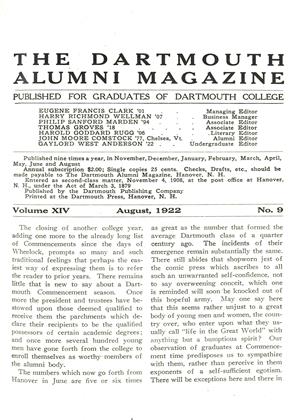Completing their third full year of post-war rejuvenation, Dartmouth undergraduate activities have now settled down to a more permanent basis. The period of uncertainty is largely past. This does not mean that no further innovations in the line of student activities are being introduced. Such would be stagnation. It does mean, however, that what is being tried out is done on a surer basis, with a definite plan and purpose, not for the sake of merely doing something new or holding down some office. A few tendencies of the better sort deserve mention as we close another academic year.
When about a year and a half ago The Bema announced what had already become very evident that henceforth the magazine would be an illustrated monthly rather than the literary organ which it had originally been, the field was clear for the establishment of a new periodical. Late this year a group of undergraduates saw the opportunity and established The DartmouthLiterary Magazine, two numbers of which have already appeared. Such a venture is always uncertain owing to the difficulty of financing it. It is to be hoped that this will escape the fate so common to such attempts and will not die out from lack of interest.
Having now run for its second complete year as a daily The Dartmouth seems to be at last finally settled on that basis, to have come out of the experimental stage, and taken its place among the leading college newspapers. The possibility of returning to a tri-weekly basis is so small as to be negligible.
In the field of dramatics and music this year has seen no real innovations. It is true that The Lambs have been organized but that was merely a more definite formulation of a policy adopted by The Players a year before. The plan of using women in the more serious feminine roles cannot be said to have been definitely inaugurated as yet since it has been used only in a play cast entirely from the faculty. The tour to Worcester and Northampton with the Carnival musical comedy was but a continuation of a precedent of several years standing, while the southern trip of the Musical Clubs was but a slight variation from the customary journey to the West.
Perhaps the most noteworthy change in student activities has been a very apparent growth in the so-called intellectual interests. The time when a single senior literary society represented the sum total of student interest in studies has passed. This last year has seen the establishment of a second senior literary society, the Pleiad, and a sophomore literary, Boar's Head. Nor has literature had a monopoly on this growth in interest. A biological fraternity and a philosophical club have both taken their place in student life. Add to these the adoption of the policy of bringing to Hanover outside speakers by both the advertising fraternity and the chemical society established about two years ago, and the expansion of an educational society; this makes the list of intellectual interests pretty full. Say what you will of the present generation of college students, they are not ashamed to acknowledge an interest in things connected with the classroom.
Coincident with this increase of societies of a more serious nature has come a fortunate tendency to do away with those that have outgrown their function. The breaking up of Proof and Copy and the discontinuance of the Occom Council are but examples of the disappearance of organizations the sole purpose of which was the'purchase of meaningless jewelry. It is to be hoped that other useless organizations will soon follow the good example.
Worthy of final mention are two institutions of the utmost importance to the undergraduate life. The first of these, The Green Key, has now been in existence for but a year, yet in that short period has already more than justified itself as a means of entertaining visitors. Its future usefulness depends largely upon the quality of men selected, upon the honesty which the members will disregard all petty fraternity lines and choose the men with the real ability. "So far they have succeeded in this essential.
The second institution, the point system for the regulation of outside activities, is still untried, not taking effect until next fall. There is little doubt, however, as to its serviceability if well administered. It has met with unqualified success elsewhere and is applicable to all conditions. This achievement alone would make the service of the 1922 Palaeopitus one which ought not to be soon forgotten.
Thus in all branches of undergraduate activity we have seen a steady broadening of scope, yet a broadening which is systematic and regular rather than spasmodic. What its result will be time alone can tell. At least it augurs well for the future.
 View Full Issue
View Full Issue
More From This Issue
-
 Article
ArticleCOMMENCEMENT 1922
August 1922 By PHILIP S. MARDEN '94 -
 Article
ArticleThe closing of another college
August 1922 -
 Article
ArticleTHIRTY YEARS
August 1922 By PROFESSOR JOHN KING LORD '68 -
 Article
ArticleALUMNI COUNCIL MEETS IN HANOVER
August 1922 -
 Sports
SportsBASEBALL
August 1922 -
 Class Notes
Class NotesCLASS OF 1911
August 1922 By Nathaniel G. Burleigh








